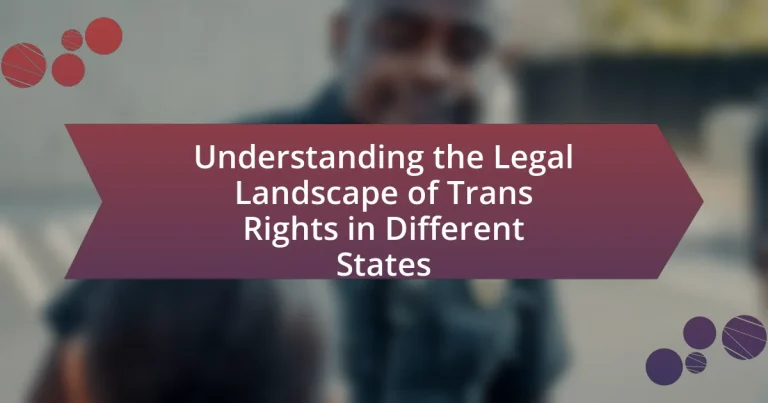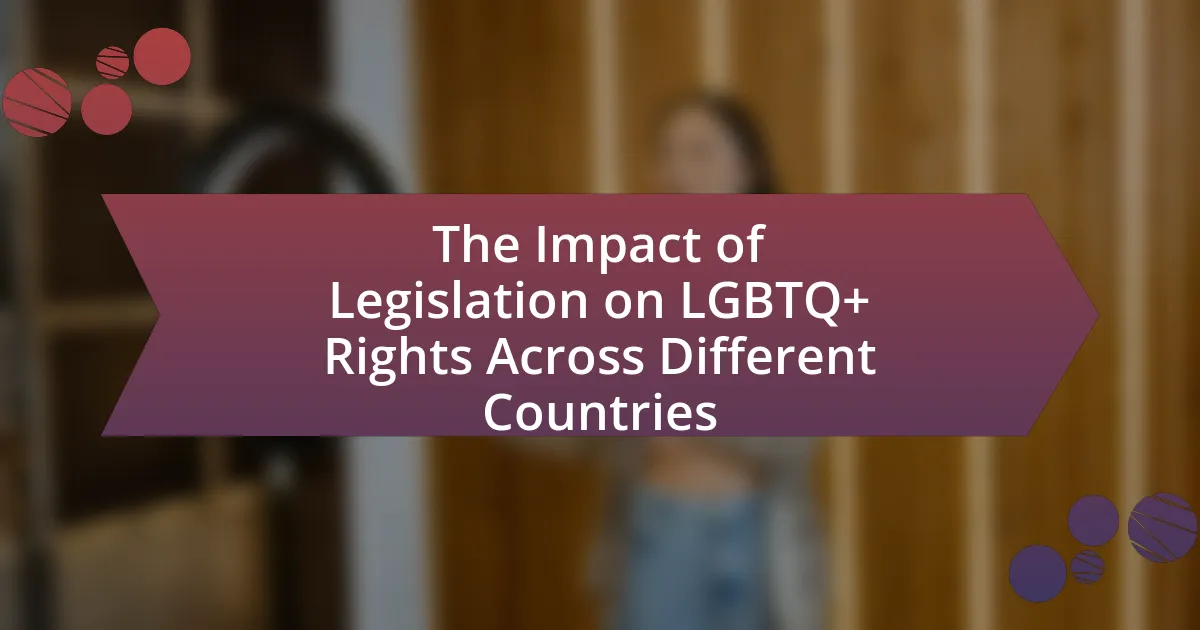The article examines the legal landscape of transgender rights across various states in the U.S., highlighting significant disparities in protections and restrictions. It details how states like California and New York offer comprehensive anti-discrimination laws and access to gender-affirming healthcare, while states such as Texas and Florida impose restrictive measures that limit these rights. Key legal issues discussed include discrimination in employment and healthcare access, as well as the impact of recent legislative changes and court rulings on trans rights. The article emphasizes the importance of understanding state-specific laws for trans individuals to navigate their rights effectively and access necessary resources.
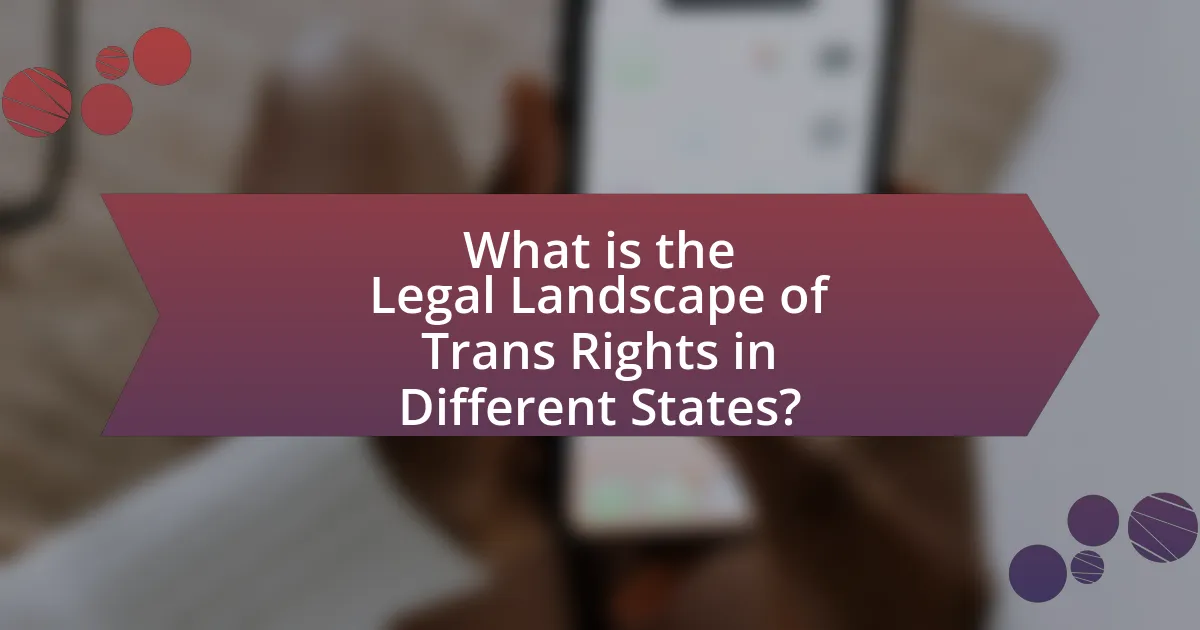
What is the Legal Landscape of Trans Rights in Different States?
The legal landscape of trans rights varies significantly across different states in the U.S. Some states, like California and New York, have comprehensive protections for transgender individuals, including anti-discrimination laws in employment, housing, and public accommodations, as well as access to gender-affirming healthcare. In contrast, states such as Texas and Florida have enacted laws that restrict the rights of transgender individuals, including prohibitions on gender-affirming medical care for minors and limitations on participation in sports based on gender identity. According to the Human Rights Campaign’s 2023 report, 20 states have laws that explicitly protect transgender rights, while 15 states have passed legislation that negatively impacts these rights, illustrating the stark divide in legal protections across the country.
How do state laws vary regarding trans rights?
State laws regarding trans rights vary significantly across the United States, with some states enacting comprehensive protections while others impose restrictive measures. For instance, states like California and New York have robust anti-discrimination laws that protect transgender individuals in employment, housing, and public accommodations. In contrast, states such as Arkansas and Tennessee have passed laws that restrict access to gender-affirming healthcare for minors and limit the ability of transgender individuals to change their gender markers on identification documents. This disparity reflects a broader national trend where legal protections for trans rights are often influenced by political, cultural, and social factors unique to each state.
What are the key legal protections for trans individuals in various states?
Key legal protections for trans individuals vary by state, encompassing anti-discrimination laws, healthcare access, and gender identity recognition. For instance, states like California and New York have comprehensive anti-discrimination laws that protect trans individuals in employment, housing, and public accommodations. Additionally, many states allow for the legal recognition of gender identity on identification documents, which is crucial for trans individuals’ rights. In healthcare, the Affordable Care Act prohibits discrimination based on gender identity, impacting access to necessary medical services. These protections are vital for ensuring the rights and dignity of trans individuals across different jurisdictions.
How do state laws address gender identity and expression?
State laws address gender identity and expression through various protections and regulations that vary significantly across the United States. Some states have enacted laws that explicitly prohibit discrimination based on gender identity in areas such as employment, housing, and public accommodations, reflecting a commitment to protecting the rights of transgender individuals. For example, states like California and New York have comprehensive anti-discrimination laws that include gender identity as a protected characteristic. Conversely, other states may lack such protections or have enacted laws that restrict the rights of transgender individuals, such as prohibiting gender-affirming healthcare for minors. This patchwork of laws illustrates the diverse legal landscape regarding gender identity and expression across different states.
Why is understanding state-specific laws important for trans individuals?
Understanding state-specific laws is crucial for trans individuals because these laws directly impact their rights, protections, and access to essential services. Each state has different regulations regarding gender identity, healthcare access, legal recognition of gender, and anti-discrimination protections. For instance, some states allow individuals to change their gender marker on identification documents easily, while others impose stringent requirements. Additionally, understanding these laws helps trans individuals navigate legal challenges, such as employment discrimination or healthcare denial, which can vary significantly from one state to another. This knowledge empowers trans individuals to advocate for their rights and make informed decisions about their lives in accordance with the legal framework of their state.
What impact do state laws have on the daily lives of trans individuals?
State laws significantly impact the daily lives of trans individuals by influencing their access to healthcare, legal recognition, and protection from discrimination. For instance, states with inclusive laws allow trans individuals to change their gender markers on identification documents, which is crucial for their social acceptance and personal safety. Conversely, states with restrictive laws may impose barriers to accessing gender-affirming healthcare, leading to negative health outcomes. According to the 2021 National Center for Transgender Equality’s “U.S. Transgender Survey,” 33% of respondents reported being denied healthcare due to their gender identity, highlighting the direct consequences of state-level policies. Additionally, anti-discrimination laws vary by state, affecting employment and housing security for trans individuals, with states lacking such protections contributing to higher rates of poverty and homelessness among this population.
How can knowledge of state laws empower trans individuals?
Knowledge of state laws can empower trans individuals by providing them with the necessary information to navigate legal rights and protections effectively. Understanding specific state laws regarding gender identity, healthcare access, and anti-discrimination measures enables trans individuals to advocate for themselves and seek legal recourse when necessary. For instance, states like California have comprehensive protections against discrimination based on gender identity, which can be leveraged by trans individuals to secure fair treatment in employment and housing. Additionally, knowledge of laws related to name and gender marker changes on identification documents allows trans individuals to align their legal identity with their gender identity, enhancing their safety and social acceptance. This empowerment through legal knowledge fosters a sense of agency and confidence in asserting their rights within their respective states.
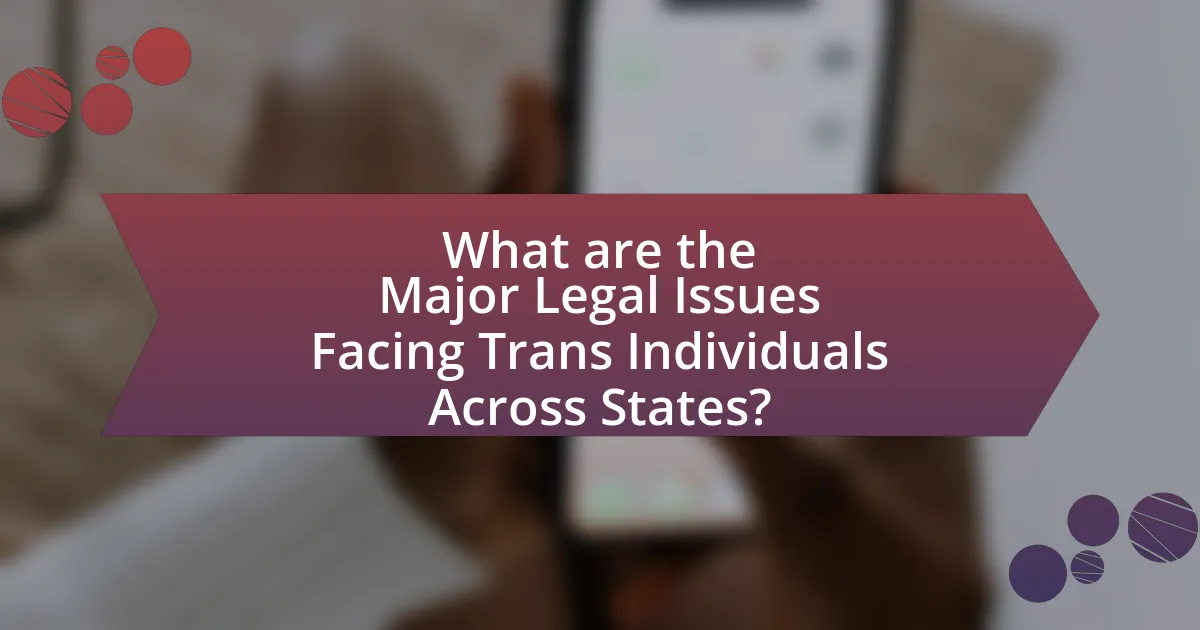
What are the Major Legal Issues Facing Trans Individuals Across States?
Major legal issues facing trans individuals across states include discrimination in employment, healthcare access, and legal recognition of gender identity. For instance, the lack of federal protections under the Civil Rights Act allows states to enact laws that can discriminate against trans individuals in the workplace. Additionally, many states have restrictive policies regarding access to gender-affirming healthcare, which can lead to significant health disparities. Legal recognition of gender identity varies widely, with some states requiring surgery for legal name and gender marker changes, while others have more inclusive policies. These disparities highlight the ongoing challenges trans individuals face in securing their rights and protections across different jurisdictions.
How do discrimination laws affect trans rights?
Discrimination laws significantly impact trans rights by providing legal protections against discrimination based on gender identity. In jurisdictions where such laws exist, trans individuals can seek recourse in cases of employment, housing, and public accommodations discrimination, thereby promoting equality and reducing instances of bias. For example, the Equality Act in the United States aims to extend civil rights protections to include gender identity, which would enhance legal safeguards for trans individuals. Conversely, in states lacking comprehensive discrimination laws, trans individuals face heightened vulnerability to discrimination and harassment, limiting their access to essential services and opportunities. This disparity illustrates the critical role that discrimination laws play in shaping the rights and protections afforded to trans individuals across different states.
What constitutes discrimination against trans individuals in different states?
Discrimination against trans individuals in different states constitutes actions or policies that deny equal rights or opportunities based on gender identity. This includes, but is not limited to, employment discrimination, denial of access to healthcare, refusal of service in public accommodations, and harassment or violence. For example, in states like Texas and Florida, laws have been enacted that restrict access to gender-affirming healthcare for minors, which is considered discriminatory by many advocacy groups. Additionally, the lack of legal protections against discrimination in employment and housing in states such as Alabama and Mississippi further exemplifies systemic discrimination faced by trans individuals. These actions violate principles of equality and non-discrimination as outlined in various civil rights frameworks.
How do anti-discrimination laws vary by state?
Anti-discrimination laws vary significantly by state, with some states offering comprehensive protections based on gender identity and sexual orientation, while others provide limited or no protections. For instance, states like California and New York have robust anti-discrimination laws that explicitly include protections for transgender individuals in employment, housing, and public accommodations. In contrast, states such as Arkansas and Tennessee have enacted laws that restrict the rights of transgender individuals, including prohibiting gender-affirming healthcare for minors. This disparity reflects a broader national trend where legal protections for transgender rights are inconsistent, influenced by local political climates and advocacy efforts.
What are the legal challenges related to healthcare access for trans individuals?
Legal challenges related to healthcare access for trans individuals include discrimination in insurance coverage, denial of care based on gender identity, and restrictive state laws. Discrimination manifests when insurance plans exclude gender-affirming treatments, which affects approximately 23% of transgender individuals who report being denied coverage for necessary medical services. Additionally, some states have enacted laws that limit or prohibit access to gender-affirming care, creating barriers that can lead to negative health outcomes. These legal obstacles contribute to significant disparities in healthcare access and outcomes for trans individuals compared to their cisgender counterparts.
What rights do trans individuals have regarding healthcare coverage?
Trans individuals have the right to access healthcare coverage that includes gender-affirming treatments and services. This right is supported by various laws and regulations, including the Affordable Care Act, which prohibits discrimination based on gender identity in health programs and activities receiving federal funding. Additionally, many states have enacted laws that explicitly require insurance plans to cover transgender-related healthcare, recognizing it as medically necessary. For instance, in 2021, the Biden administration reinforced protections for transgender individuals under the ACA, affirming that discrimination in healthcare based on gender identity is unlawful.
How do state laws impact access to gender-affirming care?
State laws significantly impact access to gender-affirming care by establishing regulations that can either facilitate or restrict such services. For instance, some states have enacted laws that require parental consent for minors seeking gender-affirming treatments, which can create barriers for youth who may not have supportive families. Conversely, states that have protective laws in place may ensure that individuals can access necessary medical care without undue obstacles. Research from the Williams Institute indicates that restrictive laws correlate with higher rates of mental health issues among transgender individuals, highlighting the critical role of legal frameworks in shaping access to care.
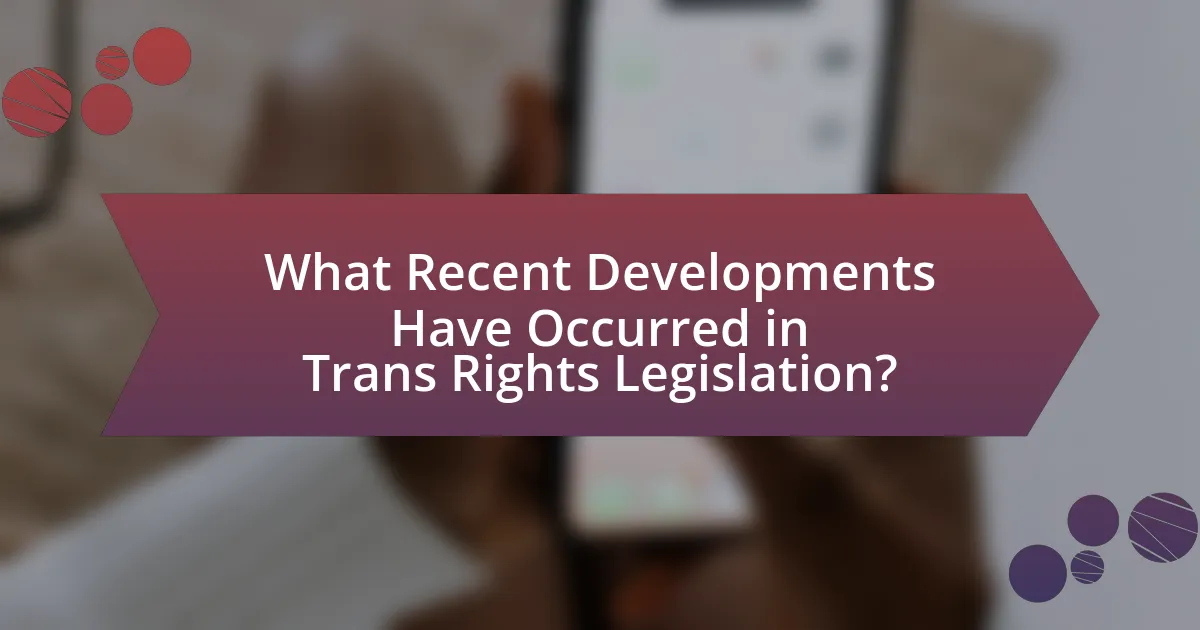
What Recent Developments Have Occurred in Trans Rights Legislation?
Recent developments in trans rights legislation include the introduction and passage of various bills aimed at expanding protections for transgender individuals across multiple states. For instance, in 2023, states like California and Illinois enacted laws that prohibit discrimination based on gender identity in employment, housing, and public accommodations. Additionally, several states have seen legislative efforts to enhance access to gender-affirming healthcare, with some states like New York implementing policies that safeguard minors’ rights to receive such care. These legislative changes reflect a growing recognition of trans rights as essential civil rights, supported by advocacy groups and public opinion trends favoring inclusivity and equality for transgender individuals.
How have recent court rulings influenced trans rights?
Recent court rulings have significantly influenced trans rights by establishing legal precedents that affirm the rights of transgender individuals in various contexts, including healthcare, employment, and education. For instance, the U.S. Supreme Court’s decision in Bostock v. Clayton County (2020) ruled that discrimination based on sexual orientation or gender identity is a violation of Title VII of the Civil Rights Act, thereby protecting transgender individuals from workplace discrimination. Additionally, lower court rulings have upheld the rights of transgender students to access facilities that align with their gender identity, reinforcing their rights in educational settings. These rulings collectively contribute to a more supportive legal framework for trans rights across multiple states.
What notable cases have shaped the legal landscape for trans rights?
Notable cases that have shaped the legal landscape for trans rights include “Bostock v. Clayton County,” where the U.S. Supreme Court ruled in 2020 that discrimination based on sexual orientation or gender identity is a form of sex discrimination under Title VII of the Civil Rights Act of 1964. This landmark decision affirmed that employees cannot be fired for being transgender or for being gay, significantly impacting workplace protections for transgender individuals. Another influential case is “Grimm v. Gloucester County School Board,” where the Fourth Circuit Court of Appeals ruled in 2020 that a transgender student has the right to use the bathroom corresponding to their gender identity, reinforcing the rights of transgender students in educational settings. These cases collectively contribute to the evolving legal recognition and protection of transgender rights across the United States.
How do these rulings differ across various jurisdictions?
Rulings regarding trans rights differ significantly across various jurisdictions, reflecting diverse legal interpretations and societal attitudes. For instance, some states, like California, have comprehensive protections for transgender individuals, including anti-discrimination laws and access to gender-affirming healthcare, while others, such as Texas, have enacted restrictive measures that limit access to such healthcare and impose legal hurdles for gender marker changes on identification documents. This disparity is evident in the varying application of the Equal Protection Clause and state-specific laws, which can lead to contrasting outcomes in cases involving employment discrimination, healthcare access, and public accommodations for transgender individuals.
What legislative changes are currently being proposed or debated?
Currently, several legislative changes regarding trans rights are being proposed or debated across various states. For instance, states like Texas and Florida are considering bills that would restrict access to gender-affirming healthcare for minors, while states such as California and New York are advancing measures to protect and expand trans rights, including access to healthcare and anti-discrimination protections. These legislative efforts reflect a broader national conversation about the rights and protections of transgender individuals, with significant implications for their legal status and access to essential services.
What are the key proposals affecting trans rights in different states?
Key proposals affecting trans rights in different states include legislation aimed at restricting access to gender-affirming healthcare, prohibiting participation in sports based on gender identity, and implementing policies for the use of restrooms corresponding to assigned sex at birth. For instance, in 2023, states like Arkansas and Alabama passed laws that ban gender-affirming treatments for minors, while states such as Florida and Texas introduced bills that limit trans athletes’ participation in school sports. These proposals reflect a broader trend of legislative actions that seek to define and often restrict the rights of transgender individuals across various states.
How might these proposals impact the future of trans rights?
These proposals could significantly restrict trans rights by introducing legislation that limits access to healthcare, education, and legal recognition for transgender individuals. For instance, laws that ban gender-affirming care for minors can lead to increased mental health issues among transgender youth, as studies show that access to such care is linked to lower rates of depression and anxiety. Additionally, proposals that undermine anti-discrimination protections may result in higher rates of discrimination in employment and housing, further marginalizing the trans community. Historical data indicates that states with more restrictive laws often see negative outcomes for trans individuals, including increased violence and social stigma.
What practical steps can trans individuals take to navigate the legal landscape?
Trans individuals can navigate the legal landscape by researching local laws regarding gender identity and expression, updating identification documents, and seeking legal assistance when necessary. Understanding state-specific regulations is crucial, as laws vary significantly; for example, some states allow for gender marker changes on IDs without surgery, while others may require medical documentation. Additionally, organizations such as the National Center for Transgender Equality provide resources and legal guides that help individuals understand their rights and the processes involved in legal name and gender changes. Engaging with local LGBTQ+ advocacy groups can also offer support and information tailored to specific legal environments.
How can trans individuals stay informed about their rights in their state?
Trans individuals can stay informed about their rights in their state by accessing resources from local LGBTQ+ organizations, legal aid services, and government websites. These organizations often provide updated information on state-specific laws, legal protections, and available resources for trans individuals. For example, the Human Rights Campaign and the National Center for Transgender Equality offer comprehensive guides and state-specific resources that outline rights and protections. Additionally, attending community meetings and workshops can facilitate direct engagement with advocates who specialize in trans rights, ensuring individuals receive the most current and relevant information.
What resources are available for legal assistance and advocacy?
Legal assistance and advocacy resources for trans rights include organizations such as the Transgender Legal Defense and Education Fund, which provides legal representation and advocacy for transgender individuals. Additionally, the National Center for Transgender Equality offers resources and support for navigating legal issues related to gender identity. Local legal aid societies often provide free or low-cost legal services to those in need, and state-specific LGBTQ+ advocacy groups can offer tailored assistance. These organizations are crucial in addressing legal challenges faced by the transgender community, as they work to ensure equal rights and protections under the law.
